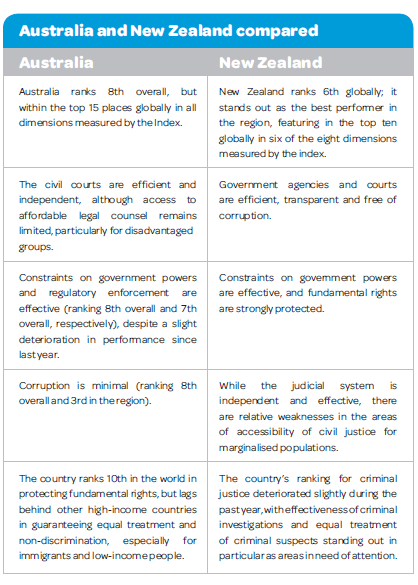New Zealand has come out in the top ten in a far-reaching survey that measures the justice systems of 99 countries, even beating its Australian counterparts.
The
World Justice Project Rule of Law Index 2014 is a 200-plus page research paper that aims to portray the rule of law as seen through the eyes of those who use the justice system around the world.
It ranks countries according to multiple indicators, including constraints on government powers, absence of corruption, open government, fundamental right, order and security, regulatory enforcement, civil justice and criminal justice.
Of the 99 countries that appeared in the results, New Zealand came sixth, beating Australia by two places.
Denmark ranked first, while Venezuela came in last place.
This week, global provider of legal, government, corporate information and research LexisNexis released a newsletter,
Advancing Together: Rule of Law Updates and Perspectives from the Asia Pacific, that broke down and explored the New Zealand and Australian results of the index.
These two countries were the best overall rule of law performers in the region, the newsletter says.

LexisNexis executive director in New Zealand Rachel Travers told
NZ Lawyer that although the Pacific region is identified as outperforming the rest of the world, the upkeep of the rule of law is crucial, even in developed regions.
“Because as soon as access to the rule of law is threatened, a countries laws, or the people will suffer from unfair work conditions, unacceptable political pressure or a derogation of their human rights.”
The WJP survey also revealed that there was an upward trend in order and security in many countries, which shows that the rule of law is advancing in many parts of the world, she says.
“The Pacific region is identified as outperforming the rest of the world in most categories of the WJP study which is fantastic news for our region and something that we can be proud of,” Travers adds. “Australia followed closely behind New Zealand in the WJP results so we can be proud as a region that we are performing well on the world stage.”
Mai Chen, Chen Palmer founding partner, told
NZ Lawyer that the results show that the rule of law matters in New Zealand and we should be able to expect that government is accountable under the law, as well as the protection of fundamental rights and fair process for all.
We must not take this for granted, she says, as it doesn’t happen in all countries - even those in our part of the Asia-Pacific world.
Chen says that although positive, the results do also reveal that there are some areas within New Zealand's justice system that are under pressure and need to be monitored closely.
"The WJP Rule of Law Index 2014 found that while our criminal justice system was scored highly for lack of corruption, we scored noticeably lower for absence of discrimination in criminal justice. The study also stated that there are relative weaknesses in the areas of accessibility of civil justice for marginalised populations," she says. "We also need to be vigilant that corruption does not increase as we get increased immigration from countries which scored very low on the WJP Rule of Law Index. The 2013 census found that one in four NZers were not born in NZ, and 37% of Aucklanders."
*Australia and New Zealand comparitive chart courtesy of the LexisNexis newsletter, based on the WJP Rule of Law Index.

